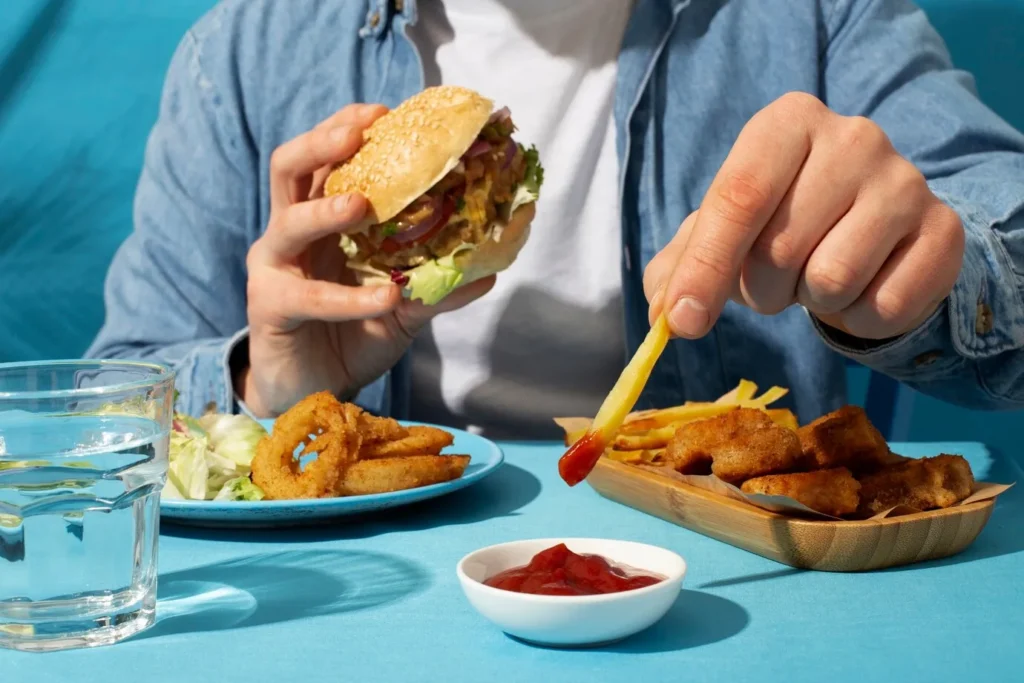
An enlarged prostate, or Benign Prostatic Hyperplasia (BPH), occurs when dihydrotestosterone (DHT) levels rise. This noncancerous illness can cause urinary issues and discomfort, lowering a man’s quality of life. Prostate growth presses on the urethra, restricting urine flow and irritating the bladder. BPH is most common in males over 50, but diet, obesity, and inactivity may accelerate development. Urinary tract infections, bladder stones, and kidney damage can result if neglected.
Benign Prostatic Hyperplasia (BPH) is a non-cancerous prostate gland enlargement that is frequently observed in men as they age. The urethra is surrounded by the prostate, which is a tiny gland that is placed below the bladder. The prostate is involved in the creation of more sperm. It is possible for it to squeeze the urethra as it grows, which might result in urinary problems.
Certain foods have the potential to worsen symptoms of prostate cancer, but a good diet can help reduce inflammation and protect urinary health.
An important factor in controlling BPH symptoms is diet. While a balanced diet can promote prostate health and lessen difficulties, some foods might exacerbate inflammation and increase urinary discomfort
Certain foods might worsen the symptoms of BPH by increasing inflammation, causing fluid retention, or irritating the bladder. Avoid these foods to assist in improving urinary function and easing discomfort.
To maintain prostate health, avoid foods that cause inflammation and aggravate symptoms.
A lot of red and processed foods have been linked to inflammation and a higher chance of having problems with your prostate. These foods have chemicals and saturated fats that can make oxidative stress worse and make prostate enlargement worse.
Saturated fats, which are found in dairy products such as whole milk, cheese, and butter, are known to cause inflammation and hormone imbalance, which may make the symptoms of benign prostatic hyperplasia (BPH) even more severe.
Spicy foods, citrus fruits, and acidic foods have the potential to irritate the lining of the bladder, which can result in increased pain and a greater need to urinate earlier than usual.
As an alternative, you might use mild seasonings such as herbs and fruits that do not include citrus, such as bananas, apples, and melons.
The consumption of excessive amounts of sugar and artificial sweeteners can lead to weight gain, inflammation, and insulin resistance, all of which may have an indirect impact on the health of the prostate.
Consuming a lot of sodium can make you retain water and raise your blood pressure, which may make your prostate swell and cause urinary pain.
Certain nutrients minimise prostate inflammation and boost prostatic function.
Consuming meals that are both anti-inflammatory and rich in nutrients can be beneficial to the health of the prostate:
When it comes to the health of the prostate, lifestyle behaviours are just as important as a balanced diet.
Hydration and exercise are essential for prostate health. Drinking adequate water flushes pollutants and maintains urinary health. Drinking less caffeine and alcohol can also help hydrate. Regular activity like walking, swimming, and strength training improves blood circulation, reduces inflammation, and helps maintain a healthy weight, which benefits prostate health.
Kegels improve urine control by strengthening the bladder and prostate muscles. A healthy diet and exercise can minimise BPH symptoms and increase well-being.
Regular medical checks help spot prostate concerns early. Regular PSA and digital rectal exams are recommended for men over 40 and those with a family history of prostate problems. Early detection helps manage BPH and prevent problems.
Personal nutrition and lifestyle advice from a doctor might also be helpful. Medication or minimally invasive therapies may help manage discomfort. Being proactive about prostate health improves long-term health.
Avoiding troublesome foods and eating a prostate-friendly diet can help men control BPH symptoms and enhance their quality of life.
Free Consultation Book Now
About The Urology Clinic Navi Mumbai
The Urology Clinic Navi Mumbai, led by Dr. Ninad Tamboli, a trusted urologist in Navi Mumbai, is your destination for expert urological care. Specializing in advanced treatments for urinary and reproductive health.
We’re here to assist you! Reach out to us for appointments, inquiries, or detailed information about our services: